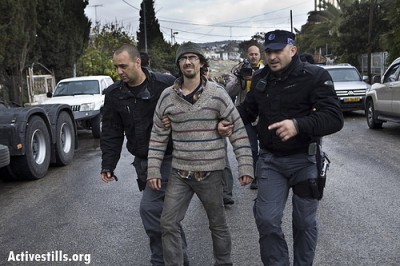Tag: Sheikh Jarrah
-
Nasser Gawi expelled from Sheikh Jarrah – settler detained, weapon seized
International Solidarity Movement 31 January 2010 Video: Settler attacks Nasser Gawi with M-16 Nasser Gawi and one settler have been expelled from the East Jerusalem neighborhood of Sheikh Jarrah for 15 days after the settler attacked local residents and threatened them with an M-16. At 7PM on Sunday night a settler occupying the Palestinian Gawi…
-
Sheikh Jarrah: Settlers throw urine bottles, activists arrested
International Solidarity Movement January 24, 2010 Thursday, January 22nd, settlers occupying the Gawi and Al-Kurd family’s homes were reported to be harassing and attempting to provoke the evicted Palestinians and solidarity activists to a violent response. Other settlers stood by with film equipment, ready to record any response to their provocation. The evening’s heckling resulted…
-
Activist Ryan Olander released from immigration detention
International Solidarity Movement 23 January 2010 As the sun set behind watchtowers and barbed wire fences at Ramle prison Thursday January 15th, Ryan Olander emerged from the steel auto locking door and into the unrestricted air. Ryan had just spent 29 days locked in the Givon immigration detention center located in Ramle, Israel following his…

